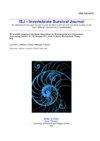A diet rich in diatom improves the antibacterial capacity of Pacific oyster Crassostrea gigas by enhancing norepinephrine-regulated immunomodulation
IF 1.2
4区 农林科学
Q4 IMMUNOLOGY
引用次数: 0
Abstract
Microalgae such as dinoflagellate and diatom are the major food source of bivalve species, and sufficient food intake contributes to the immunity and the growth of bivalves. In the present study, a monoamine oxidase gene (named as CgMAO), which is the rate-limiting enzyme of norepinephrine (NE) biosynthesis, was cloned from C. gigas. After the oysters were fed with a diet rich in diatom for 21 and 40 d, the NE contents in oyster serum, as well as the mRNA expression of CgMAO in oyster haemocytes, increased significantly compared with control group. Besides, the mRNA expression of cytokines CgTNF-1 and CgIL17-5 in haemocytes and the activities of immune-related enzymes (SOD and LYZ) in oyster serum also increased significantly after diatom feeding. These results collectively suggested that sufficient microalgae intake might significantly enhance the antibacterial capacity in oyster by prompting the biosynthesis of NE and triggering the subsequent antibacterial processes modulated by NE.富含硅藻的饲料通过增强去甲肾上腺素调节的免疫调节来提高太平洋牡蛎长牡蛎的抗菌能力
甲藻和硅藻等微藻是双壳类动物的主要食物来源,充足的食物摄入有助于双壳类动物的免疫和生长。本研究从巨噬线虫中克隆了去甲肾上腺素(NE)生物合成的限速酶单胺氧化酶基因CgMAO。饲喂富含硅藻饲料21 d和40 d后,牡蛎血清中NE含量和牡蛎血细胞中CgMAO mRNA表达量均显著高于对照组。此外,饲喂硅藻后,牡蛎血细胞中细胞因子CgTNF-1和CgIL17-5的mRNA表达量以及血清中免疫相关酶(SOD和LYZ)的活性也显著升高。综上所述,摄入足够的微藻可能通过促进NE的生物合成并触发由NE调节的后续抗菌过程来显著增强牡蛎的抗菌能力。
本文章由计算机程序翻译,如有差异,请以英文原文为准。
求助全文
约1分钟内获得全文
求助全文
来源期刊

ISJ-Invertebrate Survival Journal
IMMUNOLOGY-ZOOLOGY
CiteScore
2.10
自引率
0.00%
发文量
0
审稿时长
>12 weeks
期刊介绍:
Invertebrate Survival Journal (ISJ) is an international and open access journal devoted to prompt and innovative studies on the basic defense mechanisms in invertebrates, in particular with a view to identifying biotechnologies able to act against derived diseases and related economic damage.
Contributions will be mainly in the form of Letters to the Editor, Visions and Perspectives, Short Communications, Technical Reports, Research Reports, Review, Minireview and Reports of Meetings. Letters to the Editor can be commentaries or perspectives on invertebrate defence mechanisms or replies to the data published in ISJ.
 求助内容:
求助内容: 应助结果提醒方式:
应助结果提醒方式:


